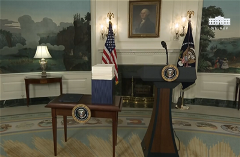Post by Glenn Bertsch, Generation Joshua Program Administrator

As you probably know, last week Congress passed and the president signed a large “omnibus” spending bill. I’m not going to address whether it was a good bill and whether or not it should have been passed and signed. However, I do want to address something I’ve seen going around Facebook.
I’ve seen numerous Facebook posts alleging something along the lines that since the omnibus bill wasn’t a “federal budget,” the president doesn’t actually need to follow it. The posts argue that, “Per the Constitution…the President must adhere to a Budget [sic] set forth by Congress and direct the expenditures as provided therein.” They continue by saying, “Pres [sic] Trump can spend this money on whatever he wants to. Or… [sic] not spend it.”
Good night! Where should I start…
First, the word “budget” never appears in the Constitution, so I have no clue where they get the notion that the president only needs to follow a “budget” and not an omnibus bill. There is absolutely no constitutional basis for that claim.
All of these posts assume there is a distinction between a budget and a spending bill, which is completely correct. However, they are utterly wrong when they try to explain the difference.
When Congress passes a budget (which is does pretty much every year), it passes a concurrent resolution. If you’ve been to iGovern, you know a concurrent resolution is passed by both the House and the Senate, but does not go to the President to be signed, and therefore, it does not have the force of law. So, what’s the point of a budget if it doesn’t actually become a law? Well, a concurrent resolution is binding on Congress, so it sets up parameters and restrictions for Congress when it passes appropriations bills. It can also be used to set up the reconciliation process, which allows certain bills to be considered without being filibustered in the Senate (this is how Congress passed the Tax Cuts and Jobs Act in 2017). Passing a budget is important, but it does not – and cannot – actually allow any money to be spent.
This is where appropriations (spending) bills come in. Congress must pass appropriations bills to actually fund the government, since the budget can’t actually do that. Technically, Congress is supposed to pass 12 different appropriations bills for every fiscal year. However, they often are unable to do that because appropriations bills can be filibustered in the Senate. When they don't pass the 12 individual bills, they will pass an omnibus appropriations bill that combines all 12 bills into one bill. Either way, it's different from a congressional budget in the fact that is actually allows money to be spent.
What about the argument that the President can spend the money on whatever he wants or refuse to spend some of the money of projects and programs he doesn’t like? The short answer is no, he cannot just spend it on whatever he wants or refuse to spend it. Congress actually addressed this issue by passing the Congressional Budget and Impoundment Control Act of 1974 (this is the same bill that set up the congressional budget process and the reconciliation process).
“Impoundment” basically means the President wouldn’t use all the money appropriated by Congress. Through most of US history, impoundment was used by presidents when Congress appropriated more money than was needed to complete a project. However, President Nixon tried to impound funds that Congress appropriated to a project that he opposed. In fact, he had vetoed the program, but Congress had overridden his veto. In response to Nixon’s impoundment of those appropriations, Congress passed the Impoundment Control Act which basically eliminated the impoundment power of the President. If the president doesn’t want to spend appropriated money, he must ask Congress to rescind the appropriated funds, and that request must be passed by both the House and the Senate within 45 days or the president must spend the money.
So, in short, the omnibus bill wasn’t a “budget” which means it actually appropriates money. And, since it actually appropriates money, the president cannot just do whatever he wants with the money, but instead must follow what Congress passed and he signed in the omnibus bill. This all stems from the fact that the Founding Fathers wanted Congress to control the purse.
I would be remiss if I didn’t mention that I have not seen the White House or anyone in the Trump Administration make any of these arguments. I have only seen this on Facebook and some blogs, but I wanted to write this post to give you the facts you need to combat this fake news.